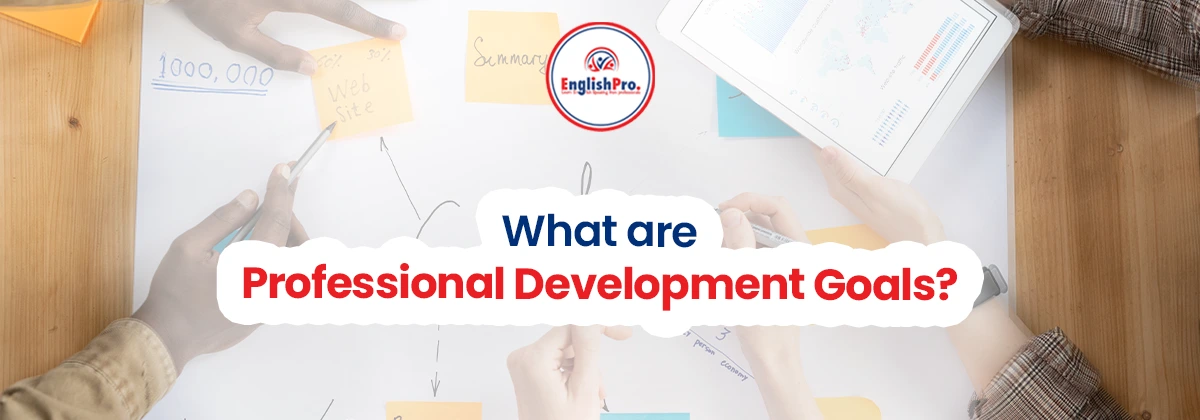Table of Contents
ToggleIntroduction
Professional development goals? To start with, if you are seeking to know what the goal of professional development is, you have to know what professional development is.
Professional development is something we cannot ignore anymore because it is required to succeed in the modern, constantly evolving working environment. Both employees and leaders, as well as educators, are becoming aware of the necessity of being able to define their career goals through establishing clear goals that transcend daily assignments. However, the sort of question many people want to know is what are professional development goals?
This article will deal with the definition, significance, and process of development of professional development objectives. We will also give examples, hints on how to detect opportunities to participate, and the way teachers and other professionals can use them and other professionals.
What are Professional Development Goals?
What are the goals of professional development? They are measurable, operational goals that one establishes in order to enhance their skills, knowledge, and career development. These goals will attract the long-term ambitions and objectives of organizations in comparison to short-term events. The major features of professional development goals are the following:
- Specificity: Most of the goals ought to be precise on the skill or outcome.
- Relevance: These must fit around the personal aspirations and workplace needs.
- Measurability: The progress has to be measured with milestones or performance indicators.
- Flexibility: The objectives must change with the trends and personal development in the industry.
The organized objectives will help professionals stay competitive, develop more confidence, and increase their career opportunities.
To complement these goals, many people also work on personality development strategies, which align professional growth with personal confidence.

Why Professional Development Goals Matter
When people ask what are professional development goals, they’re usually interested in their value. These objectives are important in that they:
- Promote lifelong learning: Maintaining freshness with what is going on in the industry makes one relevant.
- Drive career growth: They set people up to get promoted and new opportunities.
- Relieve boredom: People have a focus that helps them not feel bored.
- Promote flexibility: Development objectives help someone to be ready for new technologies and challenges in rapidly changing workplaces.
- Strengthen confidence: The accomplishments based on reaching milestones establish a feeling of accomplishment.
Therefore, Professional development goals are structured plans that give shape to your career growth, unlike vague career desires. Improving communication skills in English is one example that supports these goals across industries.
Professional Development Goals Examples
To understand better, what are the professional development goals?. The easiest way is to examine with examples. This way, you will be able to gain a better understanding of what they are.
Skill-Based Examples
- Learning a new software applicable to your work.
- Enhancement of foreign language skills to deal with foreign customers.
- Increasing presentation and public speaking skills.
Examples of Career Growth
- Obtaining a professional certification or license.
- Gaining the qualities of a leader to work as a manager.
- Developing a powerful professional network to widen the scope.
Examples of Personal Effectiveness
- Improving the management of time to ensure the working load is optimized.
- Enhancing emotional intelligence in order to act as a team player.
- Enhancing resilience at the workplace to deal with stress.
These examples show that development also ties into English-speaking courses that sharpen both technical and interpersonal abilities.
Connect with professionals and turn your goals into real success.
How to Create Effective Professional Development Goals
Setting goals requires more than wishful thinking. To make them effective:
- Use the SMART Method
- Specific: Define the exact skill or achievement.
- Measurable: Decide how you’ll track progress.
- Achievable: Ensure the goal is realistic.
- Relevant: Align with both personal and organizational priorities.
- Time-bound: Set deadlines to stay accountable.
2. Align Goals with Organizational Needs: Choose goals that support the broader mission of your workplace.
3. Seek Feedback: Discuss goals with mentors, managers, or peers for refinement.
4. Review Progress Regularly: Evaluate your milestones quarterly or monthly.
5. Celebrate Achievements: Recognize even small successes to stay motivated.
Learners often combine SMART goals with online resources such as an English-speaking course online to practice effectively from home.
Sample Professional Development Goals
Sometimes, one of the fastest ways to learn what professional goals are is to have a look at samples. Looking at these samples can make someone learn the process easier. Some of them are as follows:
- Finish a leadership training course in six months.
- Write two industry thought-leadership magazine articles.
- Raise client satisfaction score by 15 percent within one year.
- Coach two juniors to enhance leadership ability.
- Develop high-level data analysis skills to make an input in the strategic decision-making.
This kind of sample goals offers a guideline that the professionals can use in customizing to their specific scenarios. For example, teachers might also use English idioms for effective communication in their professional development.
Experience career-focused training designed for real-world success.
Identifying the Professional Development Participation Connections
An important step is to identify the professional development participation connections for this goal. This implies venturing into where and how professionals can be involved in opportunities that can result in success. The major participation approaches are:
- Workshops and Seminars: Real-time learning with gurus.
- Online Learning Platforms: Availing of flexible courses.
- Mentorship Programs: Touching the wisdom of the wise professionals.
- Networking Events: Creating good industry contacts.
- Professional Associations: Being aware of the trends and norms.
For young learners, early involvement, such as starting English education for children, can create lifelong development opportunities.
Professional Development Goals for Teachers
- Teachers are among the most important professionals when it comes to continuous learning and growth.
- They play a unique role in shaping the future of students, which is why professional development goals aren’t only helpful for teachers but crucial.
- Teachers are the people who impart knowledge, give ideas, and lead the minds of the young generation, so their development indirectly affects the new generation.
- Teachers are the people who impart knowledge, give ideas, and lead the minds of the young generation, so their development indirectly affects the new generation.
- Such objectives must revolve around bettering the teaching process, the adoption of new technologies, and inclusion in the classroom.
- With technological changes and new methodologies in the educational process, teachers will have to keep track with the times in order to remain efficient.
- For this reason, professional development for teachers is one of the most important investments in both their careers and the success of their students.
Courses like basic facts about English speaking courses can also enrich their teaching methods.
Examples include:
- Learning how to integrate digital tools for interactive learning.
- Enhancing cultural competence to support diverse student populations.
- Developing classroom management strategies to reduce disruptions.
- Improving communication skills with parents and stakeholders.
- Engaging in peer collaboration to share best practices.
Teachers who pursue these goals not only improve their own careers but also significantly impact student learning outcomes.
Beyond the Basics: New Dimensions of Professional
Most people think professional development is only about learning new skills, networking, or getting certifications. But there are also some emerging areas of professional development to focus on, such as:
- Work-life Balance: Getting to know how to put healthy limits and care about yourself in order to develop, but not to burn out.
- AI and Automation: Getting ready for the disruption of the new working era related to such new technologies as artificial intelligence.
- Emotional Intelligence: Learning how to be a better leader in terms of empathy, self-awareness, and socializing.
- Global Perspective: Developing the effectiveness of working with people of diverse cultures and in different countries.
When paying attention to these new areas, professionals will be sure that they will not only be able to confront the challenges of the present time but will be ready to cope with them in the future as well. Balancing these requires lifelong skills. Many professionals choose English-speaking education and global communication practices to stay relevant in international markets.

Conclusion
So, what are professional development goals? They are planned, measurable goals that boost abilities, professional advancements, and self-satisfaction. Whether through real-world examples or specialized strategies for teachers, professional development empowers individuals to grow in any career. These goals enable people, when they are pursued deliberately, to:
- Increase their knowledge and skills.
- Keep up to date in dynamic industries.
- Make a positive contribution to organizations.
- Have a higher level of satisfaction with career.
Remember that professional development is not a one-off task; it is a process. The more you do it, the more solid your success will be.
Still struggling to figure out the right goals for your career and personal growth?
Worry not, we’ll guide you every step of the way. Enroll today in the Personality Development course and start your journey to success.

J. Julia Kamei
J. Julia Kamei is a professional content writer with 4+ years’ experience creating impactful content for clients in the USA, India, Canada, the UK, and Europe. An M.A. History graduate, she specializes in immigration, business, IT, digital marketing, AI, and Data Science. She also mentors students for international education and research.




